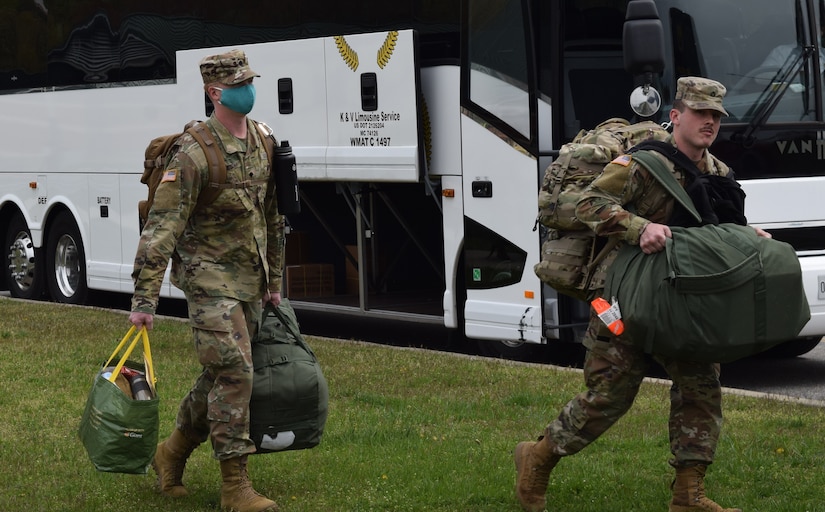April 11, 2020 | BY Joe Lacdan , Army News Service
The Army has mobilized eight Urban Augmentation Medical Task
Forces to the East Coast to support the coronavirus relief efforts and curb the
spread of disease, senior Army leaders said.
Four task forces travelled to New York City, three are
deploying to New Jersey, and one is headed to Connecticut, said Army Secretary
Ryan D. McCarthy. McCarthy discussed the task forces and other measures the
Army is taking to combat the COVID-19 pandemic during a media roundtable Friday
at the Pentagon.
Army scientists at the U.S. Army Medical Research and
Development Command at Fort Detrick, Maryland, have been working with
researchers from across the globe on COVID-19 vaccines. McCarthy said six
possible vaccines have shown the most promise; four are being tested on
animals, and two on human subjects. Additionally, two soldiers diagnosed with
coronavirus were given an antiviral drug used to treat the Ebola virus, and
they successfully recovered, McCarthy said.
''They're up and walking around,'' McCarthy said.
''Obviously, that's not that substantial of a sample size, but it shows that it
can work.''
McCarthy, who met with USAMRDC Commander Brig. Gen. Michael Talley, said the research
staff has been working relentlessly to find a viable vaccine.
''If you look across all our lines of operation, our labs
are working 24 hours a day in the pursuit of vaccine,'' McCarthy said.
To build the Urban Augmentation Medical Task Forces, the
Army called up medical professionals from Army Reserve units across the
country. The Reserve volunteers were vetted to ensure they were not already
engaged in the battle against coronavirus in their own communities, said Army
Chief of Staff Gen. James C. McConville.
''We did not want to take medical personnel out of civilian
communities where they were actually fighting the virus,'' he said.
Each task force consists of 85 people, and each has the
capability of providing the same service as a 250-bed hospital, McConville
said.
''We went ahead, and
we knew that there was going to be a lot of demand for medical professionals,''
McConville said. ''…We put together these 15 Urban Augmentation Medical Task
Forces, and they are motivated and ready to go.''
The task forces deployed to Joint Base
McGuire-Dix-Lakehurst, New Jersey, before moving on to the hospitals where they
will augment staff. Some of the units will support patients receiving treatment
at the Javits Convention Center in New York City. Others will augment community
hospitals.
Each task force has 14 physicians – including an infectious
disease specialist and four respiratory specialists. In addition, each has 16
medics, 13 nurses, five physician assistants, two dentists, four pharmacists,
two clinical psychologists, a psychiatrist, two occupational therapy
specialists, four dieticians and 18 other supporting staff.
The task forces are designed to perform low-acuity care,
officials said, but they can also test for COVID-19.
The remaining seven task forces are on standby and can be
ready to travel within 24 hours once a location is identified by Army North and
the Federal Emergency Management Agency, McConville said.
About 25,000 National Guard troops have deployed across the
United States and its territories in support of the COVID-19 response.
Guardsmen have built mobile COVID-19 test sites to relieve some of the burden
of screening emergency room patients for coronavirus at treatment facilities in
Miami and Chicago, McCarthy said. He
added that the test sites will be able to process thousands of screenings at a
faster rate.
''What it does if you go from the screening to the recovery
point and the healthcare continuum, it helps create an arm's reach in the
screening … instead of overrunning an emergency room with hundreds of people,
which then presents the challenge for health care professionals to not getting
sick,'' McCarthy said. ''So by going to the (mobile test site), you can have
many of these people get diagnosed, they get prescriptions, and they go home as
opposed to overwhelming emergency rooms.''
McCarthy said he plans to visit both test sites next week.









No comments:
Post a Comment